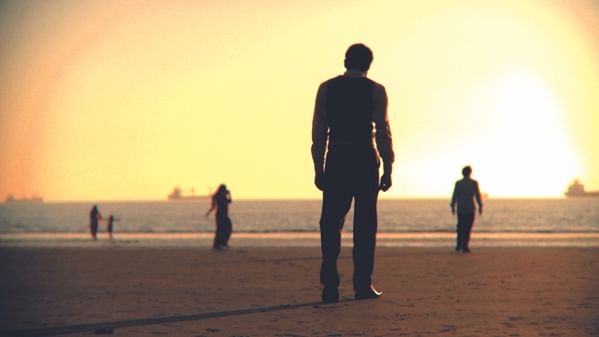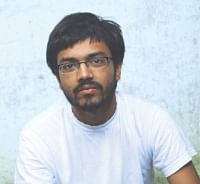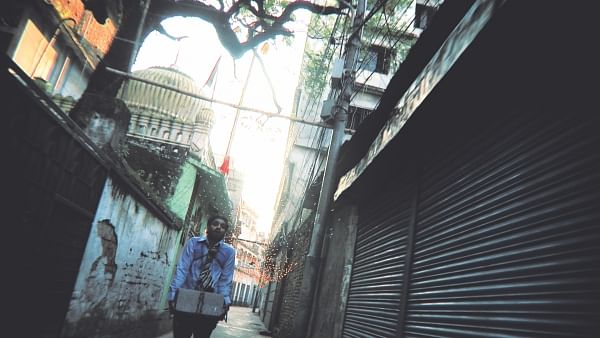| Home - Back Issues - The Team - Contact Us |
 |
| Volume 11 |Issue 25| June 22, 2012 | |
|
|
Film
Udhao (Runaway) Naeem Mohaiemen
Two years ago, the first teaser for Amit Ashraf's Udhao (Runaway) appeared on YouTube (youtu.be/1DrdOIz-3D0). Armed with a propulsive Iggy Pop beat (Nightclubbing, aka the Trainspotting theme), a thrumming guitar punctuated dimly lit scenes of a man drinking tea. A jump cut to losing consciousness, getting bundled into a van, taken to a village. And then the denouement: slapped hard by his lover. She paid for the kidnapping. Where did you run to? Why did you disappear? With a woman again? I'll have you this time. Amit's film is a conflicted, exuberant, many-headed hydra. Slaloming between hallucinatory digressions and scenes that tread deep into honeyed sentimentality, it is two films struggling for the upper hand. On first look, a pitch perfect reproduction of the themes of abandonment, betrayal, revenge, and justice that suffuse, suffocate and roadblock contemporary Bangladesh film. At the same time, a delirious, Bangla liquor fueled satirical riff on that same mawkish plot trap. There is a lot of imbibing in this film. Characters bring out a clear plastic bottle (Mum label ripped off?) filled with cholai process liquor. The milky colour reminiscent perhaps of a more gentle rice drink, and a gentler time as well. But in the cities, people are more likely to find a dangerous moonshine pick-me-up, equal parts gasoline and poison. These characters drink to forget bad memories, force themselves into amnesia. Udhao is a strange hybrid, celebrating and harpooning the three-act structure of Bangla melodramas from television and rupali porda. The casting of Animesh Aich, known also as a director of television dramas, overshadows the other actors. Even the fierce Reetu Sattar is given too little screen time, compared to Meherjaan where her woman-on-the-edge was the saving grace. In this film she seems trapped in a role of being the voice of conscience—the one no one listens to, naturally.
Animesh radiates a coiled violence – whether blowing sensual smoke at a sex worker (ready to make love or fight), chasing the kidnapper with unhinged grace or pounding a victim with a sea shell. As he holds up the bloody shell to his ear, straining to hear the sounds of the sea, I thought of the romantic moment of its acquisition. Two lovers on a Chittagong beach, gesturing towards the vendor: ogo shuncho, ota kine dao na amae (my dear, can you hear me, buy that for me, please). Ogo, Shuncho? While watching the film a second time, I talked to Amit's father, architect Khaleed Ashraf. I originally encountered Khaleed as the co-founder of 1980s Bangla satire magazine Unmad. At a distance of decades, I was hoping for some inheritance swap between Unmad and Udhao. Gently resisting that linkage, Khalid would only tell me, "Perhaps there is a sly commentary on the established trope of mother-son relationships. In the atmosphere of violence that you notice, there is also presence of a sweetness of such relationship, as much as men can muster." When the film works, it visualises in stark colours the potential for violence coiled under a ghostly haze. Dhaka as a city running hopelessly off the rails: a ruthless silver ball inside a mad pinball machine. Home to the harried everyman and the aggressive hustler. Both have a similar response: to lash out, always at somebody weaker. In this kingdom of intrigue, the only way to move up is at someone else's expense. In other moments though, the film holds back, not quite willing to go far enough. Those are the moments when I could taste the saccharine of a crowd-pleasing impulse. The few moments of gentleness seem utterly alien, imported from another film. The soul-baring morality dialogue (“I'm not a great man either, but at least I am human”) has to be, yet again, in the gentle green expanses of village scenery. I wish the camera had stayed trapped in the insane, chaotic city—stay trapped here with all of us. We don't get out, nobody gets out. The village escape is always a myth anyway, even on screen. But it does make for gorgeous sunset shots. The version I saw earlier this year was screened at Göteborg International Film Festival. Since then, there has been significant festival circuit interest. What I worry about is the well-meaning white liberal who may now try to fine tune the film, and in the process workshop it to death. This is the disease known as "death by Sundance" where the doctor kills the patient while making it more "clear," especially to a "western audience" (that wildebeest). I hope Amit avoids that temptation and advice to make things clearer, legible, and easy. Stay in the dark spaces, runaway, and fly your freak flag high. Naeem Mohaiemen works in essay, photography and film. His most recent film is United Red Army.
Copyright
(R) thedailystar.net 2012 |


